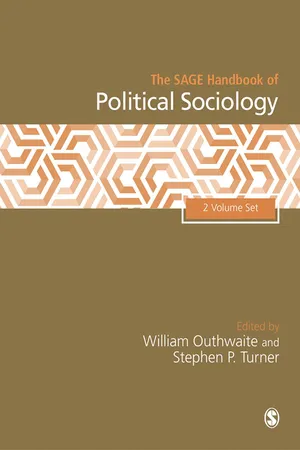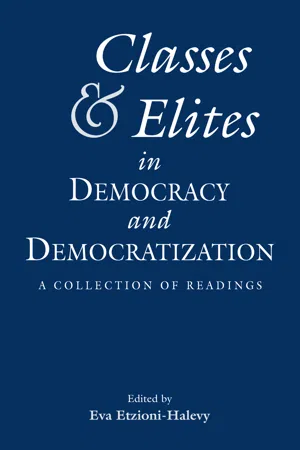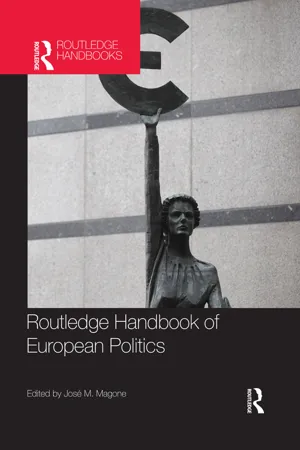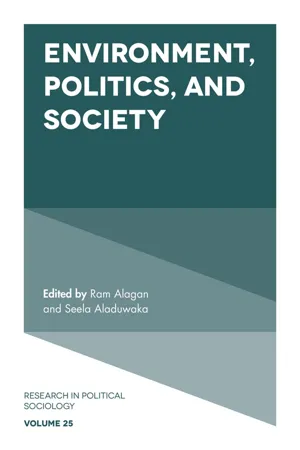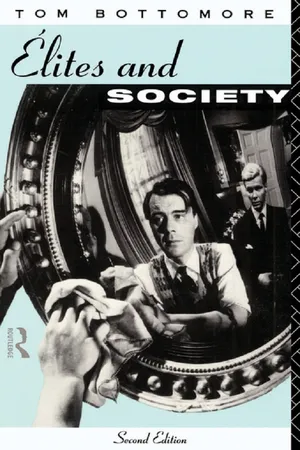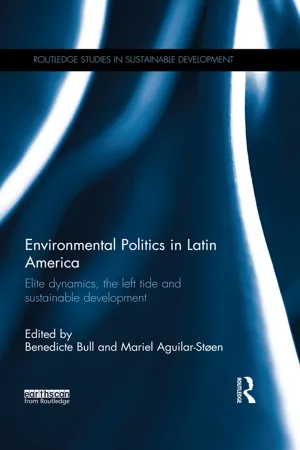Politics & International Relations
Elite Democracy
Elite democracy is a political system in which a small group of individuals, often from the economic or political elite, hold significant power and influence over decision-making processes. This model emphasizes the role of a select few in shaping policies and governing the society, potentially leading to unequal representation and limited participation from the broader population.
Written by Perlego with AI-assistance
Related key terms
Related key terms
1 of 4
Related key terms
1 of 3
10 Key excerpts on "Elite Democracy"
- eBook - ePub
- William Outhwaite, Stephen Turner, William Outhwaite, Stephen Turner(Authors)
- 2017(Publication Date)
- SAGE Publications Ltd(Publisher)
The term of élite refers, in keeping with Aron, to those who, jointly considered, have achieved a top position in a hierarchy of income or prestige; those who exercise the political functions of government belong to the political class; members of the ruling class are, finally, those who influence both the rulers and the ruled (cf. Aron, 1960, p. 267). As for the fruitfulness of the elitist theory of democracy, we may here only hint at the debate that took place in the 1960s between two highly regarded political scientists, Jack L. Walker and Robert Dahl. Walker (1966) argued against the elitist vision of the citizenry as uninformed, parochial, and uninterested in debating abstract issues. He pointed in this regard to mass protest demonstrations and rampant conflicts of various origins of the 1960s, and took issue with those élite theorists, such as Dahl and Lipset, who were concerned with the danger which active citizens and social movements might pose to democracy. In his reply to Walker, Robert Dahl (1966) observed that there is no such thing as the elitist theory of democracy, and that the authors whom Walker considers representative of this theory are ‘too mixed a bag to be useful'. Walker, moreover, mixes empirical and normative arguments. He is, finally, mistaken in thinking that a high level of political participation, through social movements or otherwise, points to the strength of democratic institutions. As for democratic elitism, this notion differs from that of the political class in that it implies that the existence of political élites is compatible with democratic institutions and procedures; in other and stronger words, according to democratic elitism ‘elites become the core of democratic … theory’ (Bachrach, 1980, p. 8). The notion of democratic elitism is thought to originate from the Austrian-American economist and sociologist Schumpeter, and refers to representative rather than direct democracy - eBook - ePub
Classes and Elites in Democracy and Democratization
A Collection of Readings
- Eva Etzioni Halevy(Author)
- 2020(Publication Date)
- Routledge(Publisher)
Similarly, for Aron, what most clearly distinguishes Western democratic from autocratic regimes is the dissociation and independence of leading minorities, or elites. Also distinctive to democracy is the free and legitimate mutual competition of the claimants to such positions, based on free elections and on consensus over the rules of the game. All this cannot ensure effective participation in the decision-making process for all, but it ensures some elite response to the needs and demands of the public.Democratic elite theorists thus share the idea that the distinctiveness of democracy lies not only in free competitive elections, but also in the autonomy of elites from each other, which enables them to countervail each others power. Thereby power restrains power, increasing the liberty of the public and the elites' responsiveness to its demands. In opposition to this it has been argued that these supposed virtues of democracy are more fiction than reality, that those who believe in them are overly complacent with respect to democracy. Further, the argument is that these theorists have offered not merely an elite but an elitist theory of democracy, one which applauds elite rule, while paying insufficient attention to the democratic role of the public. As well, they are said to have disregarded the exploitative nature of capitalism—the economic system in which democracy prevails—and its persistent economic inequalities. Before deciding in favor or against these critiques, those against whom they are leveled must be allowed to have their say.Notes1 Mosca’s concept of the ruling class differs substantially from the Marxist conception of this class, as evident from the pertinent writings in Part I of this volume.Passage contains an image
Selections from the Works ofVilfredo ParetoThe Governing Élite in Present-Day Democracy
[Élites and Non-élites]
Let us assume that in every branch of human activity each individual is given an index which stands as a sign of his capacity, very much the way grades are given in the various subjects in examinations in school. The highest type of lawyer, for instance, will be given 10. The man who does not get a client will be given 1—reserving zero for the man who is an out-and-out idiot. To the man who has made his millions—honestly or dishonestly as the case may be—we will give 10. To the man who has earned his thousands we will give 6; to such as just manage to keep out of the poor house, 1, keeping zero for those who get in . . . - eBook - ePub
- José Magone, José M. Magone(Authors)
- 2014(Publication Date)
- Routledge(Publisher)
What general trends of transformation have characterized the consolidation of democratic political elites in Europe during the twentieth century? And what is the state of European political elites after the decisive waves of democratization – the first following WWII and the second during the 1970s – that completed the re-democratization of Western Europe, removing the totalitarian regimes established in the inter-war period? Looking to the general profile of the ruling class, the evidence emerging from recent comparative studies confirms two traditional characteristics of political elites from around the world (Blondel and Mueller Rommel 2007): first, elites, as primarily male, relatively well-educated and relatively rich citizens, do not symmetrically represent the social composition of their represented universes; second, they tend to be self-interested and generally oppose any new challenger, selecting the most powerful political leader from among themselves. For the radical supporters of direct and participatory democracy, these characteristics have often been cited as indicating the structural limits of a purely elitist view of representative democracy; some of these criticisms have recently re-emerged with the new populist claims following the process of de-ideologization and the decline of mass parties (Meny and Surel 2002). However, if we examine the development of political elites in Europe over recent decades, it can be argued that the distance between representative elites and ordinary citizens is not completely crystallized, and that a number of attempts have been made to bridge this gap. For example, we should recall the slow but continuous increase in female representation at the parliamentary level (especially in Northern Europe), the debate over institutional devices intended to increase social representation (for instance the quota system for female representatives) and the introduction of specific procedures fostering transparency and participation in order to build new bridges between representative institutions and citizens (Leston Bandeira 2012). More recently, political parties have also attempted to resolve the problem of the low degree of intra-party democracy, experimenting with various modes of involvement for activists and sympathizers, both in the discussion of political purposes and in the selection of their leaders.In fact, European democracies have been quite sensitive to the democratic deficit problem presented by the political elite. The most relevant unresolved question – the Achilles’ heel of current democratic regimes – concerns the very core of representative democracy: political elites. Political elites (in particular, professional politicians sitting in representative assemblies) across Europe are the principal target of repeated waves of mistrust and disenchantment, albeit with magnitudes varying from one country to another. The institutions least trusted in public opinion are those in which the centrality of professionalized political elites is most evident. Recalling Churchill’s paradoxical view of democracy as ‘the worst form of government except for all the others that have been tried’, can we consider the persistence of a caste of politicians to be the price that must be paid to keep the democratic order alive in Europe? - eBook - ePub
Ethnic Minorities in Democratizing Muslim Countries
Turkey and Indonesia
- Maurizio Geri(Author)
- 2018(Publication Date)
- Palgrave Macmillan(Publisher)
2 This study, therefore, following Burton and Collier, defines political elites as actors either within the state or in society who are leaders because of their position in deciding or impacting political outcomes. Actors in the state are represented by the ruling segments of the state political institutions, either civilians or military, who set national polices. This includes the highest ranks of the government, parliament, judiciary, and military as well as the highest ranks of the political parties that are in charge of the government, as often they are in interchangeable positions. Political elites outside the state, by contrast, are represented by business, religious, or civil society leaders who have enough economic clout to influence politics.Regarding the main interests of the government elites, both the civilian political elites and the military ones want to rise to and remain in power to acquire, above all, political power, second, material resources, and finally, status or ideational resources (such as social esteem or prestige). Geddes argues that some elites “value office because they want to control policy, some for the pure enjoyment of influence and power, and some for the illicit material gains that come with office in some countries.”3 Nonstate business elites have instead as their main interest to acquire as much revenue from the market or subsides from the state (if they are rent-seekers) as possible.To pursue their interests, elites conduct cost–benefit analyses before making decisions; this is the basis of rational choice theory, borrowed by political science from economic science.4 This theory is not to be confused with “elite theory,”5 which argues that a minority of economic and political elites have power independently of formal state institutions. Rational choice theory claims instead that patterns of behavior in societies reflect the choices made by rational individuals as they try to maximize their benefits and minimize their costs. It is a utilitarian approach based on perfect information, cognitive ability, and time to weigh all choices against each other. From this perspective, elites also calculate costs and benefits before making decisions. Political science has used rational choice theory extensively for several decades, though it has also been criticized, so this is the first theory used in our analysis.6 - Giorgio Volpe(Author)
- 2021(Publication Date)
- Routledge(Publisher)
Such distinction not only underpins the theoretical differences between the two scholars as regards elite theory but deeply influences their judgement on the conditions and perspectives of democracy. In short, are elites compatible with democracy? Can a society dominated by one or more minorities be called democratic?Lasswell and Kaplan believe it possible, although not easy to implement. Therefore, they put forward a new formulation of the democratic rule, proposing a complex definition with many characteristics which include the fundamental principles of elitism. As outlined in the previous chapter, the first condition of the democratic rule is that the recruitment of the elites is theoretically open to all:[A] rule is equalitarian in the degree to which elite recruitment is based on values to which there is equal access. … Power is never equally distributed: there is always an elite. … Political equality … is a matter of equal eligibility to power status (of course, effective and not merely formal eligibility).89This is essentially the open ruling class of which Mosca and Pareto speak. The second condition is that the allocation of power, or participation in the decision-making process, be of the Republican type: “[A]utocracy is the form of rule in which the weight of power is chiefly in the hands of one person; oligarchy, in the hands of a group of rulers; a republic, distributed throughout the domain.” Reformulating Michels’ iron law of oligarchy, Lasswell clarifies that the concepts of autocracy and republic are idealizations: “[A]ll rules are oligarchies to a greater or lesser degree.”90 However, if the existence of the elites is an insurmountable fact, these may tend towards either an autocratic model and be exclusive or a republican one and be inclusive. The third condition concerns the scope of effective power or the area of activity with respect to which power is exercised. In this case too, the American political scientist offers a useful classification: “[T]otalitarianism is the form of rule with maximum regimentation; liberalism, with moderate regimentation; and anarchy, minimal.”91 Clearly, a democratic rule must tend towards a liberal model, in which state power only extends to specific areas. There is no explicit influence of Italian elitist thought in this case, although it is clear that on the basis of their political convictions, Pareto and Mosca would certainly have agreed with Lasswell. The fourth element is the distribution of power, which must be shared in a balanced way between various institutional subjects and not concentrated as in a dictatorship. Despite his emphasis on a realist view of politics, here Lasswell essentially proposes the classic theory of separation and balance of powers, even if later on in his text, with reference to Mosca he will point out that such division must be effective and not purely formal. Closely related to the fourth is the fifth element identified by Lasswell, that is, the impartial distribution of all values, which must be equally accessible. Here too, the American scholar’s analysis is mostly descriptive. According to Lasswell and Kaplan, it is necessary to adopt a political formula that establishes the impartiality of a rule, but: “It is clear that the definition does not require strict equality of distribution. … Indeed, a rule may be impartial even with great inequalities in distribution.” This condition is sufficient to speak of a Commonwealth: “[A] rule functioning for the common weal- eBook - ePub
- Ram Alagan, Seela Aladuwaka(Authors)
- 2018(Publication Date)
- Emerald Publishing Limited(Publisher)
Al-Aaly, 2007 , p. 69).Studying the elites in a society is of paramount importance because it largely contributes to the understanding of the State’s political regime structure and scheme. In any given society, there is always that small ruling groups that monopolize the key economic, social, and political positions; play frontline roles within the political echelon; and possess power or influence in the decision-making process.At the same time, there is always a larger ruled group, with no such powers in decision making (Lekareny, 2007 , p. 51). In other words, in any society, there is an elite having the opportunity of undertaking major roles in various fields (Bo Nouman, 2009 , p. 82). Elite is a descriptive term for individuals and groups in certain hierarchical summits (Evans & Nuinham, 2000 ) who possess the power sources and tools in the community.Elite is divided into two parts: the “central elite,” which consists of senior state officials in the executive, legislative, and judicial bodies, and the “sub-elite,” which revolves in the orbit of the central elite, it also includes the party elites that consist of the leaders of the main parties and the elites of civil society institutions that consist of a heterogeneous mixture of trade union, syndicate leaders, and feminist leaders (Burton & John, 2001 , p. 182).The historical stage in Jordan’s existence (1989–2016) has prompted many researchers to study the central elite and the political changes that have occurred in their structure and political behavior. This study aims to identify the features and characteristics of a sub-elite, namely the feminist elites that together constitute heterogeneous social, economic, cultural, and religious structures possessing power, influence, wealth, and prestige. These features influence the elites in some areas of political, economic, and social life, thereby allowing them to achieve their goals and affect public policy making in the Jordanian society. - eBook - ePub
- Tom Bottomore(Author)
- 2006(Publication Date)
- Routledge(Publisher)
Michels (1911) foresaw, but they are more easily dominated by their officials, and it is correspondingly more difficult for the rank and file members to have an effective influence in the shaping of policy.Besides these political factors, we should also consider whether there are not more general social conditions which are essential to the life and growth of a democratic system of government. It is a notable feature of therecent élite theories that, having defined democracy as simply a form of government of a whole society , and thus excluded from the definition such important features as are embodied, for example, in the notions of'social democracy', or industrial democracy', they go on to eliminate so far as possible even a cosideration of the influence which this kind of extension of democraacy may have upon the form of government itself. But this is to overlook or reject a fundamental idea of sociology — namely, that the institutions which exist inthe different spheres of society are not merly co-existent but are connectaed with each other by relations of concordance or contradiction and mutually affect each other — which was admirably formulated by Marx (1844) , in his criticism ofthe political philosophers of his day, when he argued that it was a profound error to separate the human being as a citizen (i.e. as an individual with political rights) completely form the human being as a member of civil society (i.e. as an individual engaged in family life and in economic production). Are we to suppose, for instaance, for instance, that the modern Western family, in which the relations between the members are, generally speaking, more cooperative and less authoritarian than was the case in the nineteenth century, has come into being unaffected by democratic ideas of givernment; or that once it exists it has no significance for the maintenance amd extemsopm pf de,pcratic attotides and practices in the s[jere p fgoverm,emt? Can we accept that democratic government, which requires of the individual independent judgement and active participation in deciding important social issues, will flourish when in one of the most improtant spheres of life — that of work and economic production — the great majority of individuals are denied the opportunity to take an effective part in reaching the decisions which vitally affect their lives? It does not seem to me that a person can live in a condition of complete and unalterable subordination for much of the time, and yet acquire the habits of responsible choice and self-government which political democracy calls for.It is true that in the Western societies the subordination of the individual at work is less onerous than it used to be i soem respects; workers have some influence upon working conditions through the trade unions and through institutions of joint consultation and 'social partnership' which have developed in a rudimentary fashion, while the substantial increase in leisure time lias enlarged the sphere in which they are able to decide tilings for themselves. On the other hand, much industrial work lias become more subdivided and repetitive in modem times, with the result that workers, even if they are not subjected to the old type of authoritarian control by employers, still find less and less opportunity to exercise judgement, imagination, or skill in the performance of their tasks.5 - eBook - ePub
Authoritarianism and Class in American Political Fiction
Elite Pluralism and Political Bosses in Three Post-War Novels
- David Smit(Author)
- 2022(Publication Date)
- Routledge(Publisher)
4I use the term “elite” in the common-sense formulation of E. E. Schattschneider that in politics some people and groups obviously have more power than others because they have more of what Dahl calls “political resources.” I would argue that those resources are correlated with class standing. Schattschneider’s example (1960 , 35) is that some people simply have more money than others, and therefore have the means to advertise their opinions or pay people to help implement certain policies more than the less affluent have. The fact is that those in the upper class intrinsically have more resources or they have access to greater resources than most people below them in the socio-economic hierarchy: they not only have more money; they are usually better educated than the general population and are raised in families with a network of connections to those already in power, giving them greater access to governance than members of the lower classes. This is simply a fact of life, and more ideal societies would find a way to lessen these inequalities.The ruling elite is composed not only of our elected officials and appointees to the judicial system but also members of the bureaucracy who implement policy and all those groups and organizations devoted to influencing policy or providing ideological rationales for policy-making. Most studies of the social class of ruling elites focus on the federal government. One study of the class status of all the major groups in and associated with the national government found that only thirty percent are upper class “in social origin”—defined as having at least one parent already in the ruling elite—but that the remaining seventy percent are mostly upper-middle class with only a small percentage from the poor or working class (Lerner et al. 1996 , 26). However, the class status of members of different groups in the ruling elite varies considerably depending on the group. Robert Lerner and his colleagues (1996 , 26) found that people who work for think tanks and consulting firms that try to influence policy are the most likely to be upper class. Thomas Dye (2002, 209) also argues that those who shape national policy-making, that is, those who serve on the boards of foundations and think tanks that influence policy-making at all levels of government—groups such as the Council on Foreign Relations, the Business Roundtable, the Committee on Economic Development, the Brookings Institution, the American Enterprise Institute, and the Heritage Foundation—are overwhelmingly upper-class and upper-middle-class white men. Nearly all are college-educated, close to a majority of them hold advanced degrees, or at least attended an exclusive prep school or graduated from a well-known private university. A majority are top corporate leaders. On the other hand, Lerner and his colleagues (1996 - eBook - ePub
Environmental Politics in Latin America
Elite dynamics, the left tide and sustainable development
- Benedicte Bull, Mariel Aguilar-Stoen, Benedicte Bull, Mariel Cristina Aguilar-Stoen(Authors)
- 2014(Publication Date)
- Routledge(Publisher)
Zibechi 2003 ).However, not only class theory, but also elite theory was skeptical of the virtues of pluralist democracies. Gaetano Mosca regarded universal suffrage and parliamentarianism as unable to dissolve the principle that an “organized minority” is able to “impose its will on a disorganized majority” (Mosca 1939 , p. 154), while Vilfredo Pareto famously divided society into three groups: the non-elite and the elite, subdivided into the governing elite and the rest. However, the fact that an elite was always governing, did not mean that there were necessarily the same people always ruling. Rather, the governing elites were exchanged by slowly ascending families and groups from lower classes, and would thus be replaced in a slow process of elite circulation (Pareto [1935] 1997 ). A conclusion to be drawn related to the question above, about possible changes resulting from democracy, was thus that although the political institutions would remain elitist, they could nevertheless change as new people would acquire positions. Indeed, it is this elite circulation, not the construction of political subjects among the dispossessed classes that would lead to change (Pareto, cited in Hartmann 2007 ). Thus, if we want to understand social change, we should study elites.The second process of change envisioned by Marxists emerges from the space opened for the “relative autonomy of the state” in situations of weak or split class forces (Jessop 1990 ). One argument related to the need for the state to free itself from specific capitalist forces in order to implement policies serving the fundamental interest of the ruling classes. One major task that the capitalist classes themselves are not able to perform is to establish a “political hegemony” ensuring the dominance of the lower classes. In order to do this, the state assumes a relative autonomy with regard to the bourgeoisie (Poulantzas 1978 - eBook - ePub
Democracy in Poland
Representation, participation, competition and accountability since 1989
- Anna Gwiazda(Author)
- 2015(Publication Date)
- Routledge(Publisher)
Hyland (1995) a system is democratic to the extent that all those systematically subject to decisions have equal effective rights in the making of those decisions. This definition is a high-level procedural definition.In general, there are two distinct approaches to defining democracy, that is, procedural and substantive. Procedural definitions of democracy focus on how political systems are organized in order to guarantee that democratic goals, such as representation, accountability and legitimacy, are achieved through a competitive electoral process. By contrast, a substantive (or maximalist) understanding of democracy focuses on conditions such as human welfare, individual freedom, security, equity and social rights (see Mair 2008 ).This book adopts the procedural understanding of democracy, which was developed by Joseph Schumpeter (1943 [2000]) and was given its most complete expression by Robert Dahl (1971) . This conception views democracy as a set of procedures that allows citizens to select their leaders in a competitive process. Schumpeter (1943 [2000]: 269) defined democracy as a ‘method’ for making decisions: ‘the democratic method is that institutional arrangement for arriving at political decisions in which individuals acquire the power to decide by means of a competitive struggle for the people’s vote.’ In addition to the competitive electoral process, Dahl (1971) also noted the importance of inclusive citizenship, which gives citizens the opportunity to hold the highest officials in the government accountable. According to Dahl (1989) a polyarchy is characterized by elected officials, free and fair elections, an inclusive suffrage, the right of all citizens to run for public office, freedom of expression, alternative information and associational autonomy. Therefore, Schumpeter’s conception of democracy, which is only about elections, is the ‘thin’ procedural definition. Simply, it denotes an electoral democracy. In contrast, Dahl’s definition of democracy can be defined as the ‘thick’ procedural definition because it also requires civil liberties, provision of constitutional guarantees and controls on the exercise of executive power. In addition to the elements of electoral democracy, the thick procedural conception encompasses provisions for participation, political and civic pluralism so that contending views may be expressed through ongoing processes of representation and accountability of office holders to the ruled and to one another. This is often called a liberal democracy.1
Index pages curate the most relevant extracts from our library of academic textbooks. They’ve been created using an in-house natural language model (NLM), each adding context and meaning to key research topics.
Explore more topic indexes
Explore more topic indexes
1 of 6
Explore more topic indexes
1 of 4
